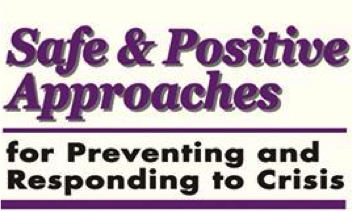Safe and Positive Approaches for Preventing
and Responding to Crisis

Part 3 - Personal Emergency Interventions TrainingPersonal Emergency Interventions Training provides staff with safe and effective control procedures used as a last‐resort in emergency crisis situations when less‐restrictive options are neither effective nor appropriate. Personal Emergency Interventions (PEIs) are designed to minimize the risk of injury and not cause pain. In addition to the physical procedures presented, the program emphasizes the importance of preventive strategies that reduce and eliminate the use of physical restraint. Learning Objectives: A. Participants will be able to identify strategies for reducing and eliminating the use of physical restraint. B. Participants will be able to identify and perform the PEIs approved for use at their setting. C. Participants will be able to identify advantages and benefits, as well as limitations, risks, and trauma and cultural considerations of each PEI procedure approved for their use. D. Participants will be able to identify when and how to terminate a PEI and be able to recognize the signs of physical and emotional distress and injury. E. Participants will be able to describe and implement the steps of the debriefing process. Core Program Components:
Organization-Approved Personal Emergency Interventions:
NOTE: PEIs are trained and utilized by staff only as approved and specified by organizational policy and procedure. Supplemental Learning Activities:
|
Program Descriptions |
